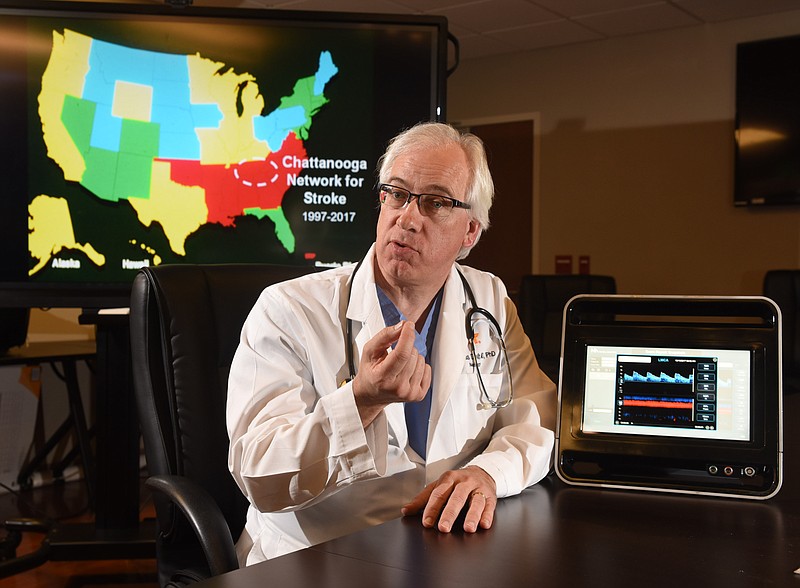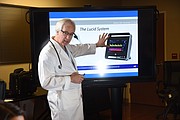Our motto is: time is brain. You have to make a diagnosis fast, and you have to get these clots out.
Every second matters when treating stroke, and local research to develop a portable diagnostic tool could help detect the problem faster, saving precious time, brain cells and lives.
The new device, called the Lucid System, is made by California- based Neural Analytics and uses ultrasound from a robotic headset placed outside the skull to non-invasively locate large blood clots that cause the most harmful strokes.
"Our motto is: time is brain. You have to make a diagnosis fast, and you have to get these clots out," said Dr. Thomas Devlin, executive director of the Erlanger Neuroscience Institute.
Before Erlanger began testing the system in October 2016, no comparable tool existed for stroke diagnosis.
Strokes occur when blood flow to the brain is disrupted by a clot, known as ischemic stroke, or bleeding, which is less common and called a hemorrhagic stroke. The longer the brain is deprived of its blood supply, the more damage occurs, so prompt diagnosis is critical to improve prognosis and prevent potential lifelong disability.
"If you get a clot there blocking the blood flow, you lose brain cells very fast," Devlin said, adding that stroke is a condition that can affect anyone, although age, an unhealthy lifestyle, high cholesterol, hypertension, diabetes, and family history can increase the risk for stroke.
About 140,000 Americans die from stroke each year, making it the fifth leading cause of death in the United States, according to the Centers for Disease Control and Prevention. But when considering health care costs and lost productivity from disability, the CDC estimates strokes cost the nation $34 billion annually.
Tennessee is the heart of the "stroke belt," the part of the United States where stroke prevalence is much higher than the national rate, which places Chattanooga "at the epicenter of this problem," Devlin said. Erlanger's high stroke patient volume and the international reputation of its stroke center made it a prime testbed for the device.
He compared the Lucid System's concept to an electrocardiogram, often abbreviated as EKG or ECG, which measures electrical waves from the heart. The test is a go-to method to quickly and safely diagnose heart attacks in emergency situations. EKGs allow emergency medical service workers to diagnose heart attacks while patients are en route to the hospital, so doctors can begin treatment as soon as the patient arrives.
A spokesperson for Neural Analytics said the company is planning to submit the device to the Federal Food and Drug Administration for approval in the coming months, with hope it'll be available commercially in 2018.
Ken Wilkerson, director of Hamilton County Emergency Medical Service, said he would love to participate in the study once the device is ready for testing in ambulances.
"Technology has allowed us to do an awful lot more than we ever dreamed of doing when I first came to work," said Wilkerson, who has worked in EMS for more than 40 years. "Now we're able to send the EKGs to the hospital, and the physicians at the hospital can see what that patient's heart is doing way before they ever see the patient, and I anticipate that this will be the same."
Contact staff writer Elizabeth Fite at efite@timesfreepress.com or 423-757-6673.

